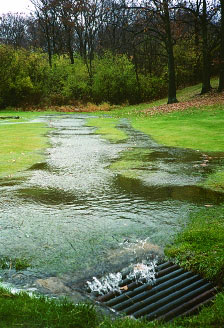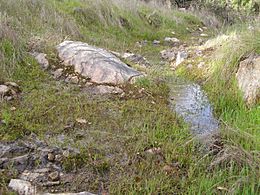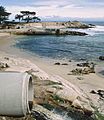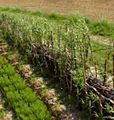Surface runoff facts for kids
Surface runoff is when extra water flows over the land. This happens when the ground can't soak up any more water, like after a heavy rain or when snow melts. It's a really important part of the water cycle, which is how water moves around our planet.
How Runoff Happens
Surface runoff can happen in a few ways. It can come from rain, snow, or when snow and glaciers melt.
Runoff from Snow and Glaciers
In places cold enough to have snow and glaciers, runoff happens when they melt. Snow usually melts the most in spring. Glaciers melt more in summer. This melting can make rivers flow much faster.
How fast snow or glaciers melt depends on the air temperature and how long the sun shines. For example, in high mountains, streams often get bigger on sunny days and smaller on cloudy days because of this.
Runoff from Rain
In areas without much snow, runoff mostly comes from rain. But not all rain causes runoff. Light rain showers can be soaked up by the soil.
Some soils, like those in parts of Australia and South Africa, can absorb a lot of rainwater. This is because certain plants there have special roots that are very good at soaking up water. Even with a lot of rain, these soils might not produce much runoff. In these areas, streams often only flow after very heavy rainfall.
Images for kids
-
Soil erosion caused by water on farmland.
-
Ponds designed to hold runoff water in the Uplands neighborhood of North Bend, Washington.
See also
 In Spanish: Escorrentía para niños
In Spanish: Escorrentía para niños







